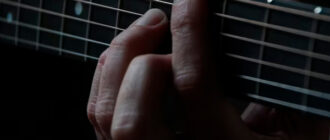Like most things related to making or playing music, the world of electric guitars is hard to navigate, especially so for a novice. Anyone has to start with something, but how to choose?
Naturally, most people choose cheap guitar brands in the beginning. Like Squier by Fender, a cheap brand that belongs to a high-end one.
There is also plenty of concerns and prejudices against cheap guitars, mostly rooted in them not sounding good. Some of them are right, some used to be right in the times when guitar production was less advanced, and some are wrong entirely.
Let’s have a deeper look at Squier, a brand wonderful in the eyes of many, versatile, and yet very cheap. And see if those guitars deserve deep consideration.

Origin of Squier guitars
The brand Squier had nothing to do with guitars upon its establishment in 1881 by Jerome Bonaparte Squier alongside his son Victor Carroll Squier. It was a violin-repairing business. Soon after the company switched to producing violin strings, eventually adding banjo and guitar strings to their product range.
In the 1930s electric musical instruments became the new popular thing, and, of course, the company started making electric guitar strings, becoming the main provider for Leo Fender’s Fender Electric Instruments.
Following his business instincts, Mr. Fender eventually offered a good price for Squier, and by 1965 became its owner, but not for long.
In about five years the Fender brand itself was sold to CBS, who abolished the Squier brand as a string manufacturer, only to use the Squier name in 1980 for their new line of guitars with affordable prices, targeted at thrifty Japanese buyers, and produced in Japan, as it was cheaper.
Making more affordable guitars came at the further low expense of salaries. The search for cheap production did not end in Japan, and Squier manufacturing had since moved all over Asia, including countries like China, Indonesia, India, and Korea. This race for low costs resulted in less quality control over production but proved to be a success anyways.

Where do they make Squier guitars now?
Some productions of Squier guitars were shut down throughout the years, including the Japanese one. The only active productions are now located in China and Indonesia, which is explained by the low costs of labor there, and this, be it fair or not, ensures low prices of Squier instruments.
Does Fender make Squier guitars?
Even though Squier is owned by Fender, it would be inconsiderate not to draw a distinct line between the two brands. They are not the same thing.
Fenders are at the top of their manufacture. Excellent guitars in every way, they use top-notch quality components, and the productions with strict quality control are located in the USA and Mexico.
Squier productions are their own thing with a different set of goals. They’re (mostly) far from terrible, but made of cheaper parts, and mass-produced by Asian workers. They were intended to be affordable and non-durable. Squier makes cheap versions of classic Fender guitars, and the two should not be mixed up.

Squier vs Fender guitars: what’s the difference?
Fender and Squier are two different brands owned by one company, Fender Musical Instruments. They needed to separate the two for a reason: the original Fender instruments are higher-end guitars, and producing cheap ones under the same name would harm the iconic image of Fender guitars.
So, are Squier guitars good or bad, if they needed such distinction?
Mainly, Squiers are made to the liking of Fenders, replicating their famous lines and models. This way you can choose a guitar close enough to the sound you go for without spending the same money as you would on an original Fender.
Surely, it’s not the same thing. The difference is quality: premium class vs. mass-market. This shows in every aspect of their production.

Woods used
Original American-made Fender guitars are considered the golden standard, and they are made of ash wood. Mexican-made ones use slightly cheaper poplar.
The Asian productions besides poplar are also using basswood or alder, pine or nato for bodies. Squier necks are usually made of maple, and fretboards use either maple or Indian laurel, with numerous variations.
This aspect probably makes the least difference to the sound, as not many people can tell the difference that sorts of wood make sonically (and those who claim they can are likely to exaggerate their professional level a bit). But the difference in looking between cheap and expensive might be rather prominent, as cheaper ones may lack in a sort of “rock star” way.

Hardware parts
The quality of different parts makes a huge difference for a guitar, and Squiers have a range in quality depending on what is used in a certain model. Let’s have a brief review.
Tuners. There are two types of tuners you can find in Squiers: vintage slotted tuners, the same as the ones on Fenders, and sealed (“closed”) tuners.
The latter can cause problems, as they are overall less convenient and harder to turn. But not only that. Let’s say, those with vintage tuners are also likelier to be overall good guitars.
On average, a Squier guitar doesn’t hold its tune very well, meaning you’ll need to tune it every time you play. But look at the bright side – this makes a great tuning-by-ear crash course for you to master guitar tuning.
Also, you can always upgrade Squier tuners to more sophisticated ones later.
Nut. Most Squier guitars have simple plastic nuts used in cheap guitars. But the Classic Vibe series, as well as the Vintage Modified, up their game by using a superior bone nut.
There is some room for a compromise, too – a synthetic bone made of plastic and bone powder, used in Bullet Strats and Telecasters.
Bridge. The quality of bridges in Squier guitars is considered OK, and the types of them vary. All Squier Stratocasters have a 6-saddle vintage-style synchronized tremolo bridge.
Squier Telecasters have either a 6-saddle hardtail bridge (Bullet Tele) or a 3-saddle vintage-style strings-through-body bridge with chrome barrel saddles (Classic Vibe Tele).

Pickups. A Squier guitar has either humbucker pickups or single coil pickups, with some no longer available options to be found on the old models. Squier guitars do not have the same pickups as Fender guitars, are considered not very good, and often become the first thing upgraded.
Electronics. The most drastic difference between a Squier guitar and a Fender guitar is the inferior quality of electronics in the Squier version. Once you start tweaking the volume or trying to change the tone, the “cheap” sound quality might become painfully obvious. And the sound quality is exactly what you pay for, after all.

Finishes and possible issues
Compared to Fenders, the finishes of Squier guitars might be kind of raw. But as long there are no critical issues found, it must be an OK guitar.
Squier guitar is one of the best and most famous low-budget guitars, so there are still certain (and high enough) standards. But there might be some imperfections caused by lower quality control.
Most often, there can be aesthetic problems, like blemishes or scratches. The second most common, and also a more important problem (luckily, a very solvable one) is sharp unpolished fret edges.
Main types of Squier guitars
The Squier guitar range consists of 6 main lines: Bullet, Affinity, Contemporary, and three Classic vibe series: 50s, 60s, and 70s, which are supposed to recreate the soundscape of the respective decades.
Besides, there is a dynamic list of series like Squier Paranormal (brought back fresh from long ago), Squier 40th Aniversary Collection, Squier Mini, or currently no longer produced but still chased after, Squier Vintage Modified Series.
They all cost anywhere from 180$ to 500$. Let’s have a brief look at what those guitar lines have to offer.
Bullet. Bullet series is the cheapest one costing 180$ on average. It has to offer three models: Classic Strat, Telecaster, and Mustang.
Affinity. The costs of Affinity Squiers are around 250$, and it has the options of Strat, Tele, and Jazzmaster, as well as some basses, like Precision and Jazz bass. Affinity Jazz basses are widely praised and beloved by many.
Both Bullet and Affinity are made of poplar, which is not the case for the following, more expensive lines.

Contemporary. These Squier Strat and Squier Tele models are significantly costlier – about 400$, and are made of alder. They are often considered easier to play for newbies due to their straight necks.
But if you look for ways to recreate, let’s say, a specific Fender Tele kind of twangy sound, this one is likely to come across as lacking – the insides of this guitar leave much to be desired.
Classic Vibe Series. Opting for one of these, you are going to get a much, much better quality guitar than the basic Bullet or Affinity, but the costs are no longer the lowest on the market.
Most models here have versions aimed at those who look for something distinct, like Squier Telecasters named Custom or Thinline. It’s also where you find your Jazz bass that sounds rich and dated.
- Classic Vibe 50s. Stratocasters and Telecasters keep reappearing throughout the Classic series, costing about 430$ each. This time it’s a combination of pine and poplar.
- Classic Vibe 60’s. The series uses nato alongside poplar, and besides Strat and Tele, there are Mustang, Jazzmaster, and Jaguar.
- Classic Vibe 70’s. Yet the same collection as in the previous series, recreated in pure poplar.
For those disappointed by the disappearance of the Vintage Modified, it is now fused with the Classic Vibe Series. This is where you find (almost) the same iconic Precision Bass or Jazzmaster. Makes sense, since both lines are about the same sonic eras. But still, why, Fender, why…

Squier Strat and Squier Tele – close enough to Fender?
With Squier Stratocasters and Squier Telecaster providing so many options, does any Strat or Tele by Squier come reasonably close to a real Fender Stratocaster?
Most people who tried both brands, claim that the Fender strat is hard to replace, and most Squiers pale in comparison. However, with more high-priced models, a Squier guitar can come pretty close, and the same goes for Fender Tele and its cheaper “twin”.
So, are Squier Guitars good?
Let’s not accidentally give Squier a bad rep it does not deserve. Squier guitars are good for many practical purposes.
There’s no argument about their inferiority to Fenders. But they are good enough as a first instrument or as one used for a hobby. They are not all over the place in terms of quality while having a super-affordable price.
It wasn’t always the case, though. Guitar production evolved rapidly in recent decades, shortening the gap between cheap and expensive guitars to an extent that many pros have no second thoughts about showing up on stage with their Squiers.
Stars who perform(ed) with Squier guitars
This by no means a complete list of musicians proves the point about Squier guitars being good enough for everybody who knows what they want out of it.
- Joe Trohman of Fall Out Boy (Squier Telecaster)
- J Mascis of dinosaur Jr. (Squier Jazzmaster)
- Mike Rutherford of Genesis (Squier Bullet Stratocaster)
- Jack Pearson of The Allman Brothers(Squier Bullet and Affinity Stratocasters)
- Jeff Healey (Squier Strat and more)
- John Mayall (range of personally Modified Squiers)
- Steve Rothery of Marillion (modified Squier Strat)
- Gary Rossington of Lynyrd Skynyrd (Squier Strat)
- Avril Lavigne (Squier Tele)
- George Harrison (Squier Stratocaster)

And how does it sound, after all?
There’s an insane amount of snobbery among “musical connoisseurs”, and some of it is well-justified. But so many established artists could not go for something that sounded straight out bad. That’s because their Squier guitars sound good enough.
Good enough doesn’t have to be top-notch. It has to be appropriate to its musical surrounding and aesthetically satisfying to the listeners. Which is achievable in the live performance on a Squier guitar.
However, we do not advise Squiers for music recording. The chain of not-too-good electronics isn’t going to shine bright in the studio, but you’ll probably upgrade at that point in your musical journey anyway.
Squier Guitar cons: things to keep in mind
You are not looking for perfection with a Squier guitar, but it doesn’t mean you should not consider it – if you are fine with the imperfections you are bound to deal with.
They are going to fall apart (eventually)
Most expensive high-end guitars are costly when new. But after a while, they become vintage and cost a fortune.
This is not going to happen to a Squier guitar (unless by the time you achieve worldwide fame). It’s not made to last forever, Squier guitars are supposed to serve as your first guitar, something you eventually move from.
This is why Fender makes Squier versions of their most legendary guitars, for you to move to the real deal when you are ready. Cheap parts and quick mass production is not the recipe for a family heirloom of an instrument.
Yet, it will last long enough for you to master your craft if you are committed. Used sensibly, it must be a perfectly fine guitar for a decade or so, or even longer.
Tuning will be very frequent
Poor ability to hold the tuning is sort of fine for a first guitar; this way it trains you every time. The skill of tuning a guitar by ear will pay off thousands of times in the future.
But once you start playing semiseriously, like in a band, this might start causing inconvenience. Your business then must be playing guitar instead of constantly tuning it. Well, there is a remedy to it – to upgrade your tuners.
Cheap kind of sound
We already discussed this enough, so not much to be added. Except that to an extent, you can solve this by changing the original not-so-good pickups and adding a decent amp to your gear. But it also might be the time to get a better guitar, if the issue becomes important.

Are Squier guitars good for beginners?
Squier guitars are gold for beginners. Can you imagine torturing a couple-thousand-dollar worth of Fender with little to no knowing what you are doing?
But if you have sonic preferences based on your favorite band, for example, you can come close by choosing one of the Squier versions of their guitars. Then hone your skills playing it till you are ready for an expensive guitar.
FAQ
Are Squier guitars as good as Fender?
Squiers are not as good as Fenders. Their production and materials are as cheap as can be, regarding the need to maintain a certain level of quality. However, for those who want a cheap counterpart of famous genre-bend Fender models, Squiers are a good enough and close enough alternative to Fender guitars.
Is Squier good quality?
Yes, Squier guitars can be considered good in terms of quality, though they are not equal to the best quality instruments. The parts they are made of are cheaper, and less precise Asian electronics are used. But mainly it is the quality of work that makes Squiers not as good as premium guitars. Yet, they are nowhere near being bad.
Do any guitarists use Squier?
There’s a plethora of professionals who have played Squier guitars live regularly or occasionally at different points in their careers. Among them are Joe Trohman, Mike Rutherford, Jeff Healey, and George Harrison, to name a few.
Are Squier guitars worth the money?
Squiers at all counts exceed what you can expect of a guitar that costs under 200$. The mere fact that many pros don’t shy away from using them now and then speaks volumes.
And if you don’t gamble on becoming a famous guitarist one day yourself, this budget guitar might be your only one, as it is more than good for learning purposes and amateur jamming.
Conclusion
So, after considering all the pros and cons, are Squier guitars good for you? No article can make your choice, but they are good if you look for a quality guitar while being on a budget. Squier Strats (or other models) might not be a perfect replacement for those who know what a real Fender Stratocaster sounds like, we understand that.
But playing guitar regularly is way more important than dreaming about a perfect one. And for that, we consider Squier guitars good as long as the one you own helps you to progress.
Read also: Guitar calluses: this is bad? An explanation of what guitar calluses are






